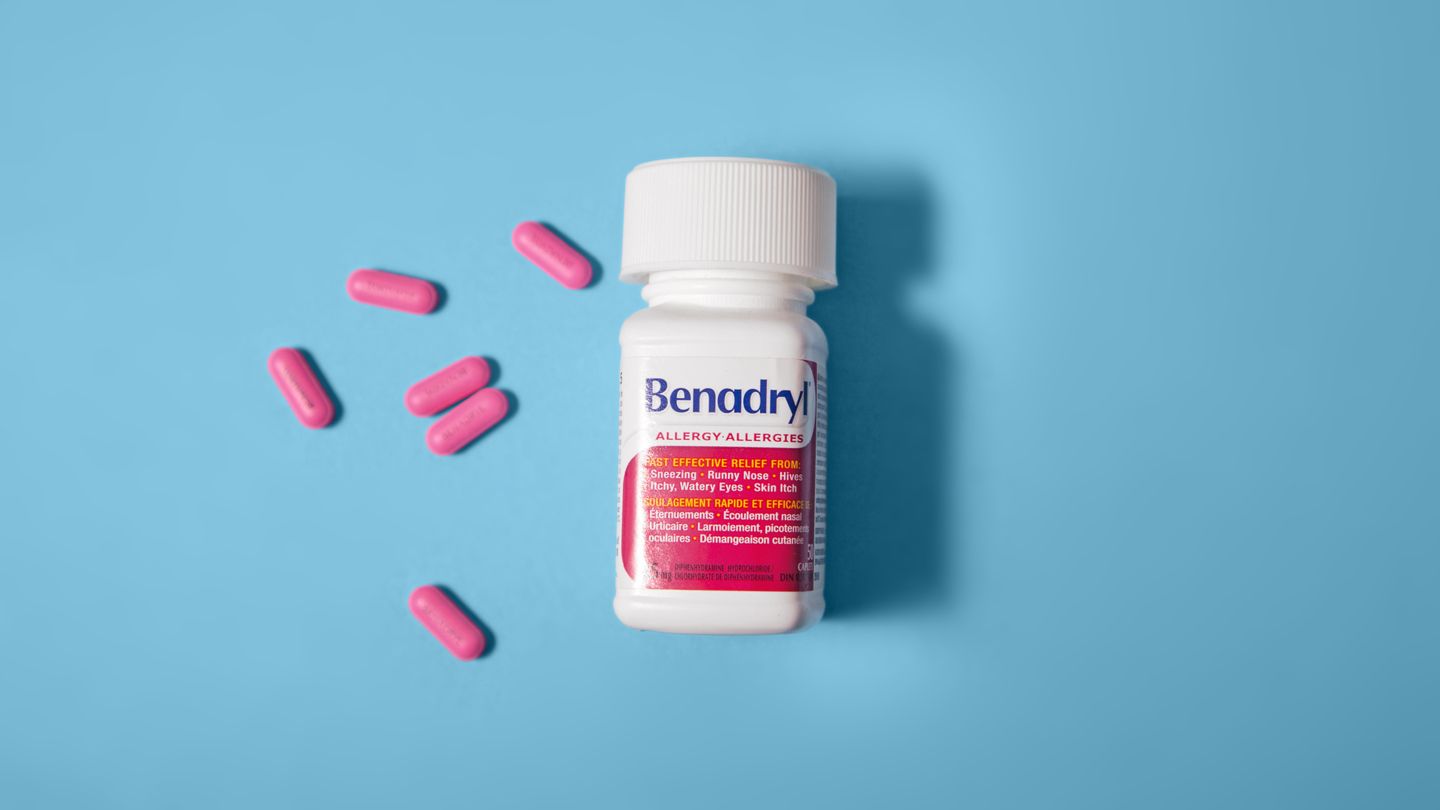You may want to reconsider reaching for the antihistamine Benadryl at the first sign of sneezing, itching, or hives. Although this familiar pink pill has been a medicine-cabinet staple for decades, some experts now say it’s time to let go of Benadryl for good.
With the advent of newer antihistamines over the past two decades, Benadryl is no longer an over-the-counter go-to for regular allergy treatment, says Sarah Taylor-Black, MD, an allergist and a clinical immunologist at Dartmouth Hitchcock Medical Center in Hanover, New Hampshire. “We definitely don’t recommend Benadryl for chronic daily use,” she says.
A recent medical review of the risks and benefits of Benadryl and its active ingredient, diphenhydramine, concluded that the drug should lose its over-the-counter status, and potentially be removed from the market altogether. “It’s time to say a final goodbye to diphenhydramine, a public health hazard,” the review authors wrote.
Breaking up with diphenhydramine would have effects beyond Benadryl — the antihistamine is found in more than 300 drug formulations, including sleep aids and cold and flu treatments.
But other physicians and public health experts think that’s an overreaction, and that Benadryl is still a useful and affordable medication — when used appropriately.
How Benadryl Works
Benadryl was the first prescription antihistamine approved by the U.S. Food and Drug Administration (FDA), in 1946, and is considered a “first-generation” antihistamine. It works by blocking histamine, a chemical the immune system releases during allergic reactions, to help ease symptoms like sneezing, watery eyes, or itchy skin.
But unlike newer allergy medications, Benadryl also crosses the blood-brain barrier and enters the central nervous system.
“That causes some side effects that don’t happen as much with the newer, ‘second generation’ medications,” says Michael Steiner, MD, MPH, the pediatrician-in-chief at UNC Children’s Hospital in Chapel Hill, North Carolina, who wasn’t involved in the recent review.
Newer antihistamines like cetirizine (Zyrtec), loratadine (Claritin), and fexofenadine (Allegra) are just as effective as diphenhydramine but have fewer side effects, are less sedating, and last up to 24 hours, says Dr. Taylor-Black. “Benadryl is only effective for 4 to 6 hours,” she says.
Is It Time to Retire Benadryl?
Some experts argue that Benadryl has outlived its usefulness — and may now be doing more harm than good.
Their reasons include:
- Significant side effects: Benadryl causes drowsiness, delayed reaction time, and confusion. One small study even found that diphenhydramine impaired driving more than alcohol. “It’s particularly dangerous in people over 65,” because of the risk that these side effects may lead to accidental falls, says Stefanie Ferreri, PharmD, a professor at the UNC Eshelman School of Pharmacy, also in Chapel Hill, who also wasn’t involved in the review.
- Cognitive risks: Benadryl blocks acetylcholine, a neurotransmitter that plays an important role in movement, memory, and digestion, among other functions. Studies have linked anticholinergic drugs like benadryl to cognitive decline and an increased risk of dementia with long-term use.
- Linked to poor quality sleep: While diphenhydramine does make it easier to fall asleep, it has downsides. There’s evidence it may decrease the quality of a person’s sleep, and that the more you take it, the less effective it becomes. It may also make you feel groggy the next day. “Chronic use of diphenhydramine for sleep is not a good idea and has side effects,” says Dr. Steiner. That’s the case with any sleep medication; long term use comes with side effects, he says.
- Was approved using outdated standards: Diphenhydramine was approved nearly 80 years ago, before the FDA required rigorous safety trials. Some countries, including Canada and the United Kingdom, now require a prescription for higher-dose forms of diphenhydramine.
When Is It Okay to Use Benadryl?
While some experts are calling for an end to its routine use, others say Benadryl still has a place in the right situations.
Benadryl may still be useful for:
- Emergency allergic reactions: It’s important to note that it is safe to give one dose of Benadryl immediately after an allergic reaction to an insect sting or food, says Taylor-Black. “Its fast-acting, sedating properties can be helpful in those acute situations, though epinephrine is still the first treatment for anaphylaxis,” a serious allergic reaction that may include throat swelling, she says.
- Occasional use in children: For children with allergic disorders who need medications daily, Benadryl isn’t the best choice because of the side effects, says Steiner. “But when used appropriately, it’s safe and effective for short-term use in children and is typically very well tolerated,” he says.
- Short-term nighttime itch relief: The drug can be useful for children with eczema (a chronic condition linked to allergies) who are struggling to sleep. “If a child can’t sleep and is scratching themselves all night, Benadryl for a couple of weeks is a situation where the pros probably outweigh the cons — but you don’t want somebody taking it daily for their entire life,” Taylor-Black says.
- Low-cost symptom relief: “One nice thing about diphenhydramine is that compared with some of the newer medications, it’s very inexpensive, so that should be taken into consideration,” says Steiner. While Benadryl has side effects, and should be used carefully, it does have 80-plus years of data to support its use, he adds.
Over-the-Counter Drugs Can Carry Risks
Steiner says that people should keep in mind that “over-the-counter” does not mean that a medication is without risk. “To become over-the-counter, medicines have to be within a certain safety and risk profile, but it doesn’t mean that all over-the-counter medications are safe for use in any condition and under any circumstance,” he says.
When emailed for comment, the Consumer Healthcare Products Association (CHPA), the trade association for over-the-counter medications, shared a statement in favor of keeping medications with diphenhydramine available to consumers.
“There’s a reason why it’s been used as a trusted ingredient in a wide-range of OTC medicines for decades: When used as directed, these medicines provide well-established therapeutic benefits for common health ailments like allergies, the common cold, motion sickness, minor skin irritations, and occasional sleeplessness,” read the statement.
CHPA points out that Bendryl’s common side effects, such as drowsiness or dry mouth, are also well-established, clearly disclosed on the Drug Facts label, and widely recognized by healthcare professionals and consumers alike.
“It’s important to underscore that these products are not intended for long-term use. Like all medicines, responsible use is essential, and consumers should always follow directions and warnings on the Drug Facts labels and consult healthcare providers if they have questions,” the statement says.
Read the full article here




